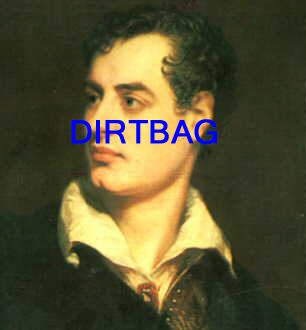There, I’ve said it. What an a**hole this guy was. After reading more and more about his background, it is clear that he was a horrible human being, likely totally incapable of any of the feelings his beautifully composed poetry portrays. Thank God for Keats.
Did you know, for example, that he severly neglected his illigitimate child, Allegra (who he routinely referred to as a bastard because, you know, it’s a term of endearment), eventually dumping her off in a convent at the age of four where she died from disease within a year? If that wasn’t bad enough, the child’s mother had spent many years begging him to allow her to visit her or to give her back to her, especially after she learned that the girl had been put in a convent. Did he allow this? No, in fact, he himself ignored Allegra’s heartbreaking letter to her father, pleading in her stilted four-year-old writing style for him to visit her, only months before she passed–he never visited her during her 13 months at the convent. (Keep in mind back then, mothers who had no money or power would have no say in custody situations.)
From The New York Times, October 13, 1983:
“By far the most heartbreaking letter on display – it may destroy a reader’s view of Lord Byron as an endearing romantic personality – is the one by Allegra Byron in 1821 when she was four years old and living in a convent school in Bagnacavallo, Italy. In the letter, written in Italian and addressed ”Caro il mio Pappa,” the child begs her father to visit her: ”It being fair-time I should so much like a visit from my Pappa, as I have many desires to satisfy, will you not please your Allegrina who loves you so?”
Allegra was the illegitimate daughter of Claire Clairmont and Lord Byron, who considered her birth ”something to repose a hope upon” because ”I must love something in my old age.” In ”Beppo: A Venetian Story,” written in 1818, the poet complained that children ”always smell of bread and butter” and professed himself incapable of paternal love. Determined to keep the child from her mother, he sent her to be educated in a convent near Ravenna. The back of the letter from the child is endorsed by Byron: ”Sincere enough, but not very flattering – for she wants to see me because it ‘is the fair’ to get some paternal Gingerbread – I suppose.”
Byron left Ravenna without visiting Allegra and never saw her again. She died seven months later at the age of five.”
When we hear so much about how athletes/entertainers/etc. fail so miserably at being “heroes”, I think it’s interesting to note that even our heroes from high school English class can be the worst sort of people. I don’t think I can ever read another word of Byron without immediately thinking of his horrible treatment and neglect of the tiny child in his care, or the mountains of women and men he mistreated so awfully over the years. Assuredly, he may have been a great writer, but his writing is now revealed to be a sham. Someone so devoid of heart could only write what people want to hear, not what he himself had experienced or given to others in the selfless manner that love demands. Maybe not an issue in certain types of writing (yellow journalism, guides to technical devices, crossword puzzles)…but poetry! If you take the feeling out of the poetry, who cares to read it? So, I pronouce all his works “officially bullshit”. Let’s please not waste any more time with Byron and his long-running-Romantic-poet-scam. The man was a coward, child abuser and all-around-jerk. If only he had been on the boat with Shelley that fateful day, (Shelley not exactly a sweetheart himself).
Have you ever been disappointed by a hero? (Or, even more importantly, have a hero who HASN’T disappointed you?)

